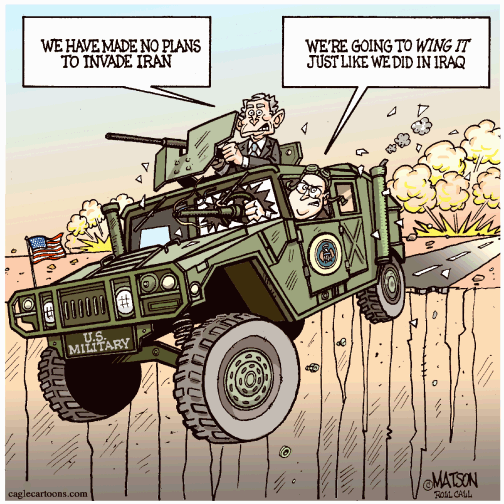Search
Recent comments
- ukraine's agony has not started yet....
15 hours 30 min ago - all defeated.....
15 hours 42 min ago - beyond crime.....
16 hours 32 min ago - the end....
16 hours 43 min ago - odessa....
17 hours 50 min ago - weitz....
19 hours 40 min ago - bidenomics BS.....
19 hours 54 min ago - the defeat of ukraine is coming....
20 hours 42 min ago - paris is sick....
1 day 8 hours ago - German spies?....
1 day 9 hours ago
Democracy Links
Member's Off-site Blogs
gulf of tonkin revisited .....

‘The timing of the recent incident in which 15 British sailors were arrested by Iran at the mouth of the Shatt al-Arab waterway for purportedly entering Iranian waters couldn't have been more provocative if it had been planned that way. And perhaps it was. The question is, however, who did the planning?
It happened on the eve of a vote in the UN Security Council to impose stricter sanctions on Iran and in the wake of escalating rhetoric from U.S. government officials blaming Iran for anti-occupation activity in Iraq. On top of that, recent events include the kidnapping of Iranian consular officials in Irbil, Kurdistan, by U.S. forces, reports of covert U.S. support for terrorist attacks inside Iran, the "disappearance" of a major Iranian military figure in the elite Revolutionary Guards unit, and suspicions that the Mossad may have had a hand in killing a renowned Iranian nuclear scientist. Add it all up, and there seems little doubt as to who carried out what seems like a brazen provocation.
Go here for the semi-official British version of the confrontation: according to this account, we are supposed to believe that the Iranians entered Iraqi waters to "ambush" the Brits, who were engaged in what is described as a "routine" patrol of the disputed waterway in search of suspected smugglers. Car smugglers were offloading their merchandise onto a barge when they were approached by the Brit patrol and fled into Iranian waters – but not before "irking" the British crew.’
- By John Richardson at 29 Mar 2007 - 12:43am
- John Richardson's blog
- Login or register to post comments
Fraudulent Bushiott
From the Washington Post
How Bogus Letter Became a Case for War
Intelligence Failures Surrounded Inquiry on Iraq-Niger Uranium Claim
By Peter Eisner
Washington Post Staff Writer
Tuesday, April 3, 2007; A01
It was 3 a.m. in Italy on Jan. 29, 2003, when President Bush in Washington began reading his State of the Union address that included the now famous -- later retracted -- 16 words: "The British Government has learned that Saddam Hussein recently sought significant quantities of uranium from Africa."
Like most Europeans, Elisabetta Burba, an investigative reporter for the Italian newsweekly Panorama, waited until the next day to read the newspaper accounts of Bush's remarks. But when she came to the 16 words, she recalled, she got a sudden sinking feeling in her stomach. She wondered: How could the American president have mentioned a uranium sale from Africa?
Burba felt uneasy because more than three months earlier, she had turned over to the U.S. Embassy in Rome documents about an alleged uranium sale by the central African nation of Niger. And she knew now that the documents were fraudulent and the 16 words wrong.